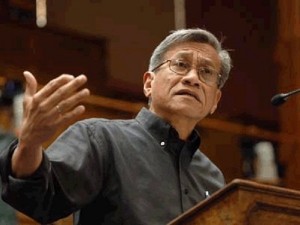Lawmakers grill defense official over Edca
MANILA, Philippines – Lawmakers squared off with a defense official over the recently signed agreement increasing American troops’ presence in the country, saying that the deal does not guarantee protection and that it gives too much advantage to US troops.
During Thursday’s hearing by the House foreign affairs committee, Akbayan Representative Walden Bello and Bayan Muna Rep. Neri Colmenares grilled Defense Undersecretary Lorenzo Pio Batino over the Enhanced Defense Cooperation Agreement (Edca).
Bello said Edca did not give specific mandate for the US to protect the Philippines in case of attacks over its territorial disputes in the Spratlys islands.
The lawmaker also noted that the Mutual Defense Treaty (MDT), which compels both countries to protect each other in case of an attack, was signed long before the Philippines raised its claim on the Spratlys.
Bello then questioned if Edca, called an agreement implementing the MDT, specifically said the US is bound to protect the Philippines over a territorial spat.
Batino said the MDT deemed an armed attack as those on the country’s island territories in the Pacific.
“If there’s an armed attack on Philippine vessels and aircraft in the West Philippine Sea, then the applicable article in the treaty would come into play,” Batino said.
Bello said this provision could not be implemented because the US does not even recognize the disputed islands as part of Philippine jurisdiction.
“The truth of the pudding is the US does not consider the Scarborough Shoal, the Ayungin or the Kalayaan Group of Islands as part of the MDT,” he said.
“My point is that the agreement has shallow assumptions on US intent,” Bello added.
Meanwhile, Rep. Colmenares grilled Batino over the access provisions of Edca.
Batino maintained that Edca only granted temporary presence of American troops, allaying fears that the deal would signal the return of US bases in the country.
But Colmenares said the deal grants US troops too many activities in agreed locations. These activities include training, deployment of forces, storage of equipment, among others.
“These activities are too wide-ranging. It is not unreasonable for others to think that this is a new bases agreement,” Colmenares said in Filipino.
The defense official said the deal does not grant the US troops its own base since these were still considered Philippine-owned bases.
“These are not foreign bases. The Edca provides agreed locations (for US troops) as determined by the Armed Forces of the Philippines,” Batino said.
Colmenares however said US troops have more “operational control” over their locations as stated in Edca, to which Batino said the American soldiers only have control over their own forces.
Below are the important provisions of the agreement:
- It gives the United States access to “agreed locations,” mostly Philippine military facilities, for security cooperation exercises, joint training, etc. US forces may also use these locations for bunkering of vessels, refueling of aircraft, temporary accommodation of personnel, prepositioning of equipment and supplies, etc.
- The locations will be used by US forces without rental or similar costs. However, payment for the use of water, electricity and other public utilities will be shared “pro rata.”
- US will be allowed “operational control” of agreed locations. They may also make “alterations and improvements” to the facilities. US forces and US contractors “shall have unimpeded access to agreed locations” for the storage of defense equipment, supplies and prepositioned materiel.
- The Philippines will retain ownership of the locations. However, the US may use permanent buildings it has constructed until it is no longer required by its forces. The parties will agree on the terms of return of any of the agreed locations, including “possible compensation for improvements or construction.”
- Resolution of disputes on the Edca shall be resolved between the two countries. It “shall not be referred to any national or international court, tribunal, or other similar body, or to any third party for settlement, unless otherwise agreed by the Parties.”
RELATED STORIES
5 things you need to know about EDCA
